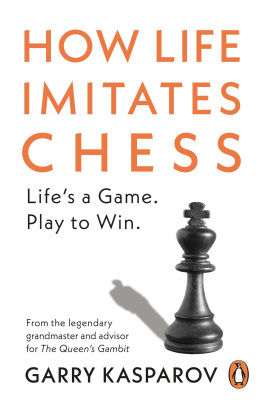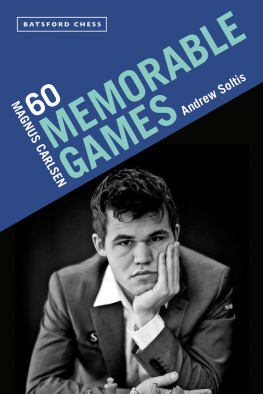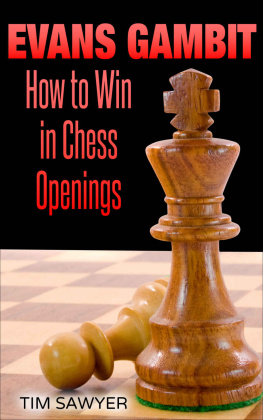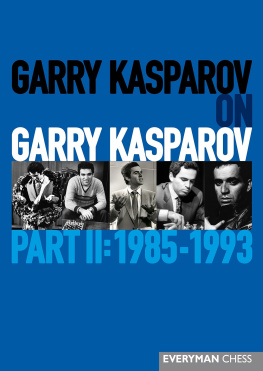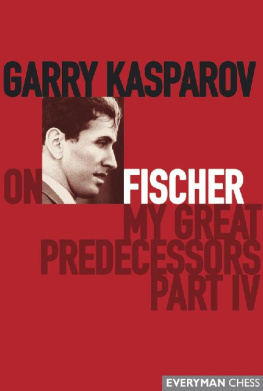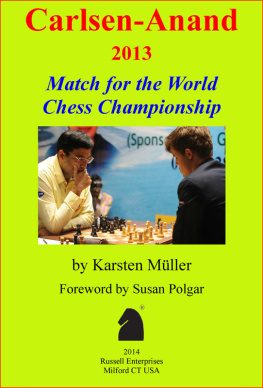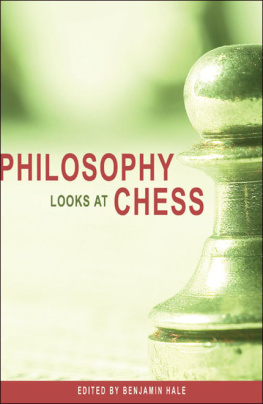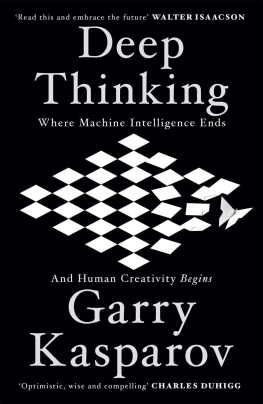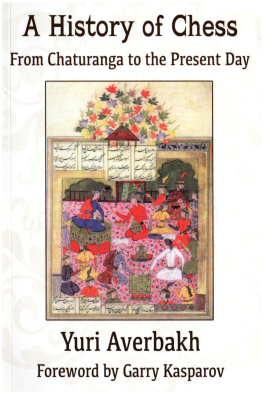About the Author
Garry Kasparov is the greatest chess player of all time, world champion at the age of twenty-two and the top ranked player in the world for two decades. His matches against the IBM supercomputer Deep Blue put chess and artificial intelligence on front pages around the world. Kasparov writes frequently for many major publications on world affairs and AI. He lectures widely to business and academic audiences on decision making and the human-machine relationship. The Kasparov Chess Foundation promotes chess in schools, and he is the chairman of the Human Rights Foundation and the Renew Democracy Initiative. Kasparovs books include Winter Is Coming: Why Vladimir Putin and the Enemies of the Free World Must Be Stopped (2015), Deep Thinking: Where Machine Intelligence Ends and Human Creativity Begins (2017) and the acclaimed chess series My Great Predecessors and Kasparov on Kasparov. He lives in New York City.

Epilogue
Your life is your preparation
What we make of the future is defined not only by our past but by how well we understand and make use of that past. I look back over the first half of my life as if at the globe my parents gave me as a child. In what we value, in where we find success and failure, our pasts create a map not only of where we have come from, but of where we are going. But the most wondrous thing about this map of the future is that it is not engraved in stone. With insight and effort we can shape it to our will.
The second half of my life will contain many new challenges. I have new goals, new people in my life, and I have left behind the only vocation I have ever known. And yet as foreign as it has seemed at first, my life in chess has left me well prepared for this new course. I ask myself, how can I be afraid of a mere KGB lieutenant-colonel after overcoming an Olympus of chess champions! Why should my nerves fail me in front of heads of state or CEOs of multinational corporations when I have spent my entire life on stage?
After a lifetime of preparation and self-examination I believe I have the tools I need to adapt to this new struggle. There are new strategies, new tactics, and I dont expect the transition always to be a smooth one. My personal map is full of grey areas and its outer borders are never entirely complete. Most importantly of all, I have learned not to fear those unknown territories.
My nine-year-old son Vadim is reaching the age where my own childhood memories are vivid. While his life will of course be very different from mine, I dearly hope to provide him the guidance I know my father would have continued to provide me. I have been fortunate to meet Daria, now my friend, supporter and wife. Above all, Im infinitely grateful that the same person who guided me through my first career, my mother Klara, is again with me at the start of my second. Whenever Im faced with a difficult path her words inspire me: If not you, who else?
No more secrets
The purpose of this book is to inspire fellow explorers. We can all look at our own personal maps and cast off for unknown domains where we will encounter new challenges. We can accept that failure is a necessary part of success. The faith that led Magellan to attempt to circumnavigate the globe in 1519 is why we remember him. But few remember that he was not among the eighteen survivors who completed the journey.
Like any explorer we must first plan our route, our strategy. Then we must marshal our resources, allocating them carefully while obtaining what we need and discarding any excess. Once under way, we need to maintain a sharp tactical eye by never backing away from conflict unless we are certain it best suits our needs to do so. Remaining alert for dangers and opportunities should not be allowed to distract us from our course. We must be aware of changes in our environment at all times, looking for chances to make positive exchanges that will take advantage of new conditions.
Above all, we must be conscious of every decision we make. Not only in evaluating each future course of action but in looking back to analyse our past choices and the effectiveness of the process by which we made them.
Instead of making us weary, our explorations should energize us, suffusing us with new confidence and inspiration. Our senses are sharpened and unknown challenges soon become a sight more welcome than a familiar routine. New stimuli develop our intuition. We see the trends forming, the big picture and the details stay in focus at the same time, the dots become easier to connect. When a crisis comes our instincts serve as an early-warning system. If we are caught by surprise our reflexes give us the chance to take the offensive instead of playing defence.
Nearly twenty years ago I concluded a precocious autobiography with the words Time after time, as Ive outgrown another problem or defeated another opponent, I have seen that the main battles are yet to come My fight is open-ended. Now I know this fight wasnt only with the Soviet Sports Committee or FIDE or the Kremlin, but also with my own abilities and limitations. Our energies can be directed towards taking responsibility for our fates, towards creating change and making a difference. How success is measured is different for each of us. The first and most important step is realizing that the secret of success is inside.

Additional Epilogue
A Strategy for Democracy
At the end of 2006, as this book was headed to the printer in several countries, the internal political chaos in Russia spilled out into the worlds headlines. A British national, KGB agent defector and harsh critic of the Kremlin, Alexander Litvinenko, was assassinated with the rare radioactive substance polonium 210. The investigation into his death is currently taking place in at least three countries.
Litvinenkos murder came on the heels of the well-known investigative journalist Anna Politkovskaya on Russian president Vladimir Putins birthday, no less. The killings have turned a spotlight on what the West had assumed was the autocratic-but-stable Putin regime. Suddenly the foreign media is realizing what we in the Russian opposition have been saying for years the Kremlin is ever closer to dictatorship than democracy and is not stable at all.
This interest has led to a corresponding increase in attention about my own role in the opposition movement, and to questions about how my former career as a chess champion has aided my mission. With that in mind, my publisher wondered if it wouldnt be appropriate to include some last-minute comments about how I have applied the lessons presented in this book to my political fight in Russia.
But this epilogue more than a topical convenience. While writing this book and preparing my business lectures, I have discovered a great deal about synthesizing these lessons and using them in practice. It is quite accurate to say that I have been learning from my own book, confirming the old adage that the best way to learn a topic is to teach it.
The most important, and most difficult, element on my new political agenda was developing a strategy that would pump life into the anti-Putin forces. It was like sitting down to a chess game already in progress and discovering my side was close to checkmate in every variation. I could immediately draw a parallel to my first world championship match, the 198485 marathon against Anatoly Karpov. There I spent months a step away from total disaster, a situation that required an entirely new strategy, one based more on survival than triumph. I did it; I survived to fight another day, and the next time we met I was victorious.

